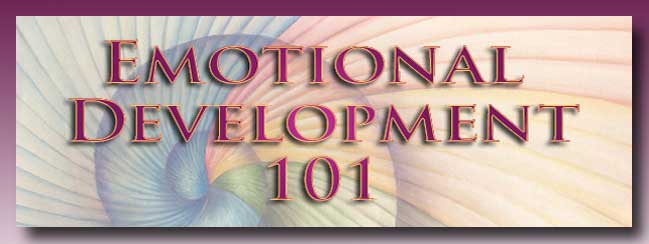|
Pamela Levin, R.N.,
T.S.T.A., 1/20/11
Pamela
Levin is an R.N. and a Teaching and Supervising Transactional Analyst with 600+ postgraduate hours
in clinical nutrition, herbology and applied kinesiology. In private practice
48 years, she has seen first-hand the commonalities
between the emotional tasks of infants and children and those of adults. She teaches her
award-winning work on the process of healthy emotional development throughout life
in
Emotional
Development 101. [your affiliate link to
ed101]
One of the biggest mistakes
we make - and one that has the power to sabotage our relationships - is that we fail to take
into account each others' emotional state. But emotional states are part of being alive - and
they're part of every relationship. If we express them well, they contribute to the loving,
nourishing relationships we need to sustain us.
But handle them poorly, and the result can
be disruption so complete that the relationship breaks down completely. In short, we can only
benefit by learning to handle our emotional states well. What constructive cues can we take from
how infants deal with their emotional states? Infants remind us that:
1. The purpose of emotional expression
isto feel
better by being heard and understood,
not to make someone else feel bad.
2. Saying - "I'm mad," " I'm scared", "I'm sad "- is
aboutdeclaring what we
feel, not about competition. The old ploy: "You
feel X, well what about me?" moves relationships in the opposite direction from nourishing and
fulfilling.
3. Two people canfeel at
the same time. The fact that one person is
expressing an emotional state does not negate such states in others.
4. Expressing an emotion is aboutcreating camaraderie, closeness and
understanding, not about negating what someone
else feels. Each person has an equal right to feel.
5. Sharing an emotional state is
aboutconveying feeling experiences to
others, not about placing blame. Feelings are
feelings; responsibility and causation are a different subject. "I hurt, I hurt I hurt" is an
example of feeling expression. Who or what caused that hurt is about establishing
responsibility and boundaries - a different process.
As adults, we can express an emotion without escalating it. In other
words, we can transmit what we feel to another without increasing its intensity. No need to hit
someone over the head with it! Further, if we sense the other person is not receiving what we're
saying, we can use words. For example:
"I need to know you heard me and what I
feel."
"Will you please translate back me what you heard me say? Because our
relationship is important to me, I want to reveal any misperceptions before they have an
opportunity to grow both roots and wings!"
"I know you have strong feelings about this too. Let me know you accurately received what I
said so we can move on to what you feel."
Combining these lessons from infants with our adult skills is a great way to create the
relationships of our dreams. To understand and facilitate your emotional
development at every stage of growth, go to [affiliate product link][your
clickbank link].
Tags: sucessful relationships healthy relationship tips traits of successful relationships relationship support healthy relationship characteristics expressing emotions feelings in a relationship emotional states
|
|


